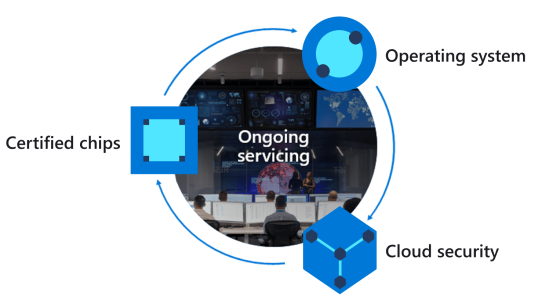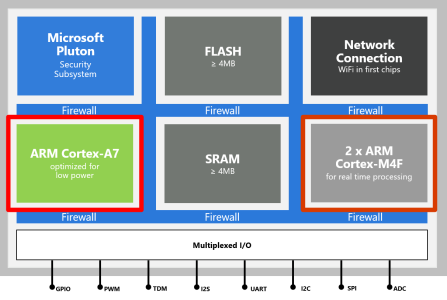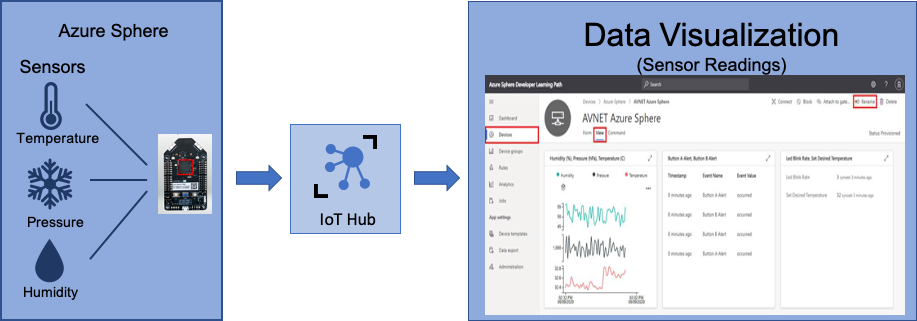Introduction
Building and running an application on microcontroller Internet of Things (IoT) devices can be challenging. These challenges could range from ease of development to securely capturing and transferring the data to a server.
With Azure Sphere, you can build IoT solutions that are secure by default with the confidence that your device is protected, your application is protected, and data is protected in transit.
You can build applications with Visual Studio or Visual Studio Code or integrate with your existing toolchains on Windows and Linux. Visual Studio and Visual Studio Code development environments provide integrated microcontroller debuggers and full source-code control, along with collaboration and productivity tools.
What is Azure Sphere
Azure Sphere is a comprehensive IoT security solution – including hardware, OS, and cloud components – to actively protect your devices, your business, and your customers.
Azure Sphere is made up of the following components:
- Azure Sphere–certified chips from hardware partners include built-in Microsoft security technology to provide connectivity and a dependable hardware root of trust.
- Azure Sphere OS adds layers of protection and ongoing security updates to create a trustworthy platform for new IoT experiences.
- Azure Sphere Security Service brokers trust for device-to-cloud communication, detects threats, and renews device security.
Together these components implement The Seven Properties of Highly Secure Devices.

Azure Sphere architecture
The Azure Sphere microcontroller unit (MCU) has three developer-accessible cores, a Cortex-A7 that runs a Linux kernel, and two Cortex-M4 cores that can run bare-metal code, or a real-time operating system such as Azure RTOS or FreeRTOS.
High-level applications running on the Cortex-A7 Linux kernel are used for less timing-sensitive tasks such as establishing network connections, negotiating security, updating device state, communicating with real-time core applications, and sending telemetry messages to cloud gateways such as IoT Hub.

Developer tools
You can develop Azure Sphere applications from Windows and Linux. On Windows, you can use either Visual Studio 2019 or later (free community edition or better) or Visual Studio Code. On Linux, you use Visual Studio Code. You can simultaneously develop and debug applications running on all three cores.
This learning module supports developers on Linux and Windows using Visual Studio Code. If you are a Windows user comfortable using Visual Studio, then use Visual Studio appreciating the IDE screenshots included in this module will be different.
Lab environment monitoring and control for sensitive microbiology experiments
Suppose you're a scientist in a microbiology laboratory who is responsible for storing samples from tests. You want to build a system that monitors the environment around the laboratory equipment in real time. This system would monitor the following room conditions:
- Pressure
- Temperature
- Humidity
Previously these were recorded manually by the lab assistants using sensors at regular intervals. Manual recording of ambient conditions is a tedious job that is also prone to human error. Having any issues with the sensors would invalidate the tests performed in the lab environment.
Maintaining the room conditions accurately is critical for managing the laboratory. The lab needs to maintain the right conditions to help you get more accurate results. Any variation in the conditions can affect the equipment temperature during the storage and manipulation of the samples, specimens, and lab equipment. This could impact the ability to produce the correct and stable results and can also have an economic impact on the organization.
Proposed new system
The proposed new system would have the following factors:
- It would need the sensors within the lab at multiple points.
- The system must be secure from attack as some experiments are commercially sensitive and expensive.
- These sensors will automate the reading of air pressure, temperature, and humidity conditions at defined intervals.
- The sensor data from the devices will be transmitted securely for the analysis of data trends.
- Able to control a heating, ventilation, and air conditioning unit (HVAC) to automatically adjust the environment to match requires for lab experiments.
- Flexible enough to support future more sensitive lab environment sensors.
The solution must be built on an IoT platform that is highly secure, that is protected from attack and software bugs. Additionally, the system can trigger an alarm or alert message to a concerned authority when any of the defined parameters fall outside of expected ranges.

Learning objectives
In this module, you will:
- Create an Azure IoT Hub and a Device Provisioning Service (DPS)
- Build and deploy an Azure Sphere application
- Display environment data with the Azure IoT Explorer
- Control an Azure Sphere application using Azure IoT Hub device twins and direct method commands
- Deploy a new more sensitive room sensor onto an Azure Sphere real-time core running Azure RTOS
- Read the data from the new sensor running on the real-time core and send the data to IoT Hub
Prerequisites
- Azure Sphere kit
- Visual Studio Code installed in your computer
- Ability to use Visual Studio Code
- Git installed in your computer
- Ability to use Git/GitHub
- Basic knowledge of Azure Sphere
- Basic knowledge of Azure IoT